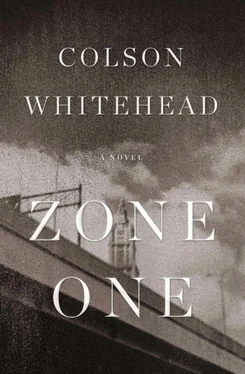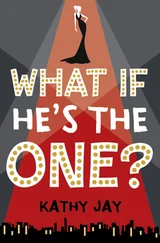They had been young and old, natives and newcomers. No matter the hue of their skins, dark or light, no matter the names of their gods or the absences they countenanced, they had all strived, struggled, and loved in their small, human fashion. Now they were mostly mouths and fingers, fingers for extracting entrails from soft cavities, and mouths to rend and devour in pieces the distinct human faces they captured, that these faces might become less distinct, de-individuated flaps of masticated flesh, rendered anonymous like them, the dead. Their mouths could no longer manage speech yet they spoke nonetheless, saying what the city had always told its citizens, from the first settlers hundreds of years ago, to the shattered survivors of the garrison. What the plague had always told its hosts, from the first human being to have its blood invaded, to the latest victim out in the wasteland: I am going to eat you up.
Mark Spitz’s idea of what lay beyond the Zone, the portrait created by the incessant gunfire, was dwarfed by the spectacle before him. The wall had kept this reality from him. It would not hold, it was obvious. He had to get back to Kaitlyn and Gary, and they needed to make a plan. The dead leaked in massive piles on the other side of the wall, mounting between the barrier and the buildings on the north side of Canal. It would have been impossible for the cranes to keep up, even in working condition. The dead clambered up the bodies of the fallen and were rent by the artillery, contributing to the heap, and these latest were trampled by the next wave, which was cut down in turn. The corpses entwined and tangled in a mutilated pile half as high as the wall, and dark fluids from their wounds sprayed and gurgled through the seams in the concrete where the broad sections met, the weight of the corpses compressing the interior murk from the carcasses as if they were overripe fruit. The barrier was a dam now, suppressing the roiling torrent of the wasteland. It would not hold.
He saw the flaw, where it would break. The marines had maneuvered the concrete T segments into the heart of Canal, and once they stabilized the Zone, they secured them with redoubtable steel brackets two feet wide and two inches thick. The metal scaffolding of the catwalk assembly provided additional support on the Zone side against the malevolent forces of uptown. But Mark Spitz saw the chink through now-wastelanded eyes: the brackets were as flimsy as plywood boards nailed into a window frame, in that elemental image of the barricade. That’s where every fortification splintered: where the nail pierced the wood, the rivet penetrated the concrete. The prayer met the truth. There is always a place for the dead to find purchase.
This night it was not a ravaged, skeletal hand that tore the plank away but the unholy mass of all the mobilized agony brimming Broadway. There was a furious blast of machine-gun fire, and more dead fell to the fleshy heap. The bracket at the western edge of the T section athwart the famous boulevard wrenched out of joint, and its brother connecting the next section east ejected from its moorings. It flew across the intersection and pulverized the face of an army clerk who had been gesturing to one of the snipers in her aerie. The tumbling concrete section ripped the catwalk free, and the metal armature halted the descent of the wall for a moment while hurling soldiers into the street; then it gave way. The soldier with the obliterated face fell to his knees at the same time the concrete slab hit the ground, crushing the Disposal agent who had been steering a load of rotting pets toward the incinerators and a young soldier who had been climbing one of the ladders up the catwalk. The dead sloshed through the gap, clambering over the concrete ramp and the crushed bodies, losing balance on the uneven surface and spinning in ludicrous pratfalls onto Canal. They stepped on one another, impelled one another forward in a current, spread in hungry rivulets east and west and downtown after being penned in for so long. Some of the dead that had been trapped at the bottom of the pile staggered to their feet and joined the advance.
Here they came, the ambassadors of nil. Already the front door of the bank was impassable, already the dead infiltrated one block south of the shattered barrier to reclaim the Zone as their own. The soldiers on the catwalk were stranded. They fired their assault rifles down into the maelstrom of skels, but the scaffolding terminated in ramps at either end and the men and women on the wall were cornered. The time to risk a jump disappeared; there was no open space for a landing, so swiftly had the dead swept into the street. A portion of skels dallied to partake of the stunned soldiers at the foot of the wall, but most coursed down the avenue after other sustenance. The majority of the abominations did not stop to feed, as if being loosed upon the emptied streets was meal enough, as if right now it sufficed for them to walk, to persist beyond death.
Looking down at them through the twisting ash, Mark Spitz shuddered. The dead streamed past the building like characters on an electronic ticker in Times Square, abstractions as impenetrable as the Quiet Storm’s vehicles. He’d always peered from the skyscraper windows into the streets, seeking. Close to the ground, almost at their level, he read their inhuman scroll as an argument: I was here, I am here now, I have existed, I exist still. This is our town.
An explosion complicated the darkness in staggered eruptions, dispatching new quakes and tremors to replace the silenced barrage from the artillery. A truck’s engine block, traversing space in a depleted, burning arc, crashed into a fast-food establishment catty-corner to the bank. Mark Spitz had eaten there seven times in his life, across the years. It had never been a destination but was a refuge in the middle of city missions, in between things, to kill time until the rain stopped, it was warm and he’d been there before. It was part of his city.
“That’s the diesel going up,” Bozeman said. Stray bullet, or the self-immolation of a drowning soldier taking those nibbling monsters in the blast radius with him. The snipers shrunk from their posts to secure a getaway, too late. The entrance to any building in Mark Spitz’s vision was already surrounded. He heard Fabio strategize as the three of them scrambled down the stairs to secure the front door of the bank, but Mark Spitz’s brain was too embroiled in his survival schemes to comprehend. Just like old times. “Does this mean we stop referring to it as an interregnum, then?” he said. Addressing Omega. But they were not present. He supplied Gary’s rejoinder: “ ‘Time out’ is more like it.” A grenade exploded outside.
When he reached the marble landing overlooking the main floor—after equipping himself in the office with an assault rifle, some clips, and, in a last-minute impulse, an armadillo helmet—the front door had been secured, the handles of the oversize brass doors swaddled in black cable. Five others remained in the building: Fabio; Bozeman; two rookie-faced army chumps named Chad and Nelson, whom Mark Spitz didn’t recognize; and a furious Ms. Macy, who checked and double-checked the clip of a nine-millimeter pistol in muttering debate with herself. If pressed, with a gun to his temple or teeth to his jugular, Mark Spitz would have sworn she was saying, “Knew I should have taken that chopper.”
Chad stuttered that they’d secured the south exit—the Lispenard access. Wonton had blown through the back wall of the bank to connect it with the rest of the block, which was shallow for the grid. It was Sunday night. Troops had been deployed to recon Happy Acres, and there had been more soldiers than usual manning the wall and the rooftops to tend to the dead swell, but the majority of the garrison was dispersed throughout the Zone, engaged in their R & R amusements and Sunday-night solaces. The A-list snipers and the sweepers, the indispensable clerks, and the doe-eyed engineers. With General Summers off duty, at her quarters, Bozeman was in charge. Summers lived on Greenwich, in a loft owned by a famously dissipated scion of European royalty. Great art, everyone reported. “Should we try to get to her?” Fabio asked.
Читать дальше












